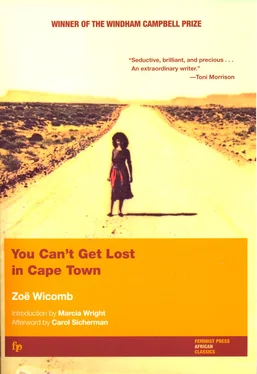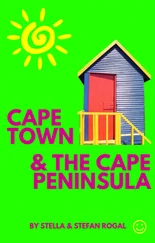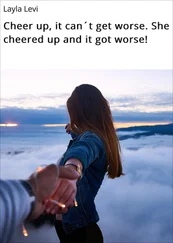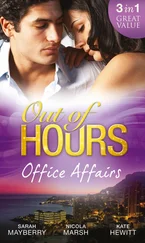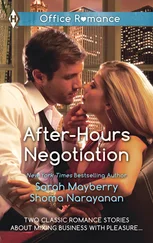I am wrenched out of sleep by the commotion outside my compartment door. A whining ‘Please my baas,’ and the Boer’s, ‘This way, you drunk bastard.’ And the terror tightens in my chest as the key fumbles in the door and the long silver tongue of the lock flicks over. The blue-eyed guard holds the sliding door with his uniformed thigh while he turns on the light and beckons to someone outside.
‘Come boy, and behave yourself; here’s a woman up there.’ But he does not as much as glance at me lying on the top bunk.
A young man stumbles in with a record player and drops it loud enough to drown Blue Eyes’ key locking the door. I practise a number of sentences of protest and see myself charging after the guard in the corridor only to be met by the rebuff of ice-blue eyes staring through me uncomprehendingly. I do not choose to put up with the man in my compartment; fear of both men leaves me lying frozen in my bunk.
I keep a concealed eye trained on him slumped on the opposite seat. He has brought with him the sour smell of sweat and too much wine. He pulls out the foldaway table and carefully sets up his record player and the disc to which he hums, She wears my ring.
Under cover of the music the halted blood resumes its course through my veins. I manoeuvre my left elbow to support my body in readiness to defend myself against this man who will not leave me alone for long. I freeze again as he takes a bottle of brandy from his pocket and shouts, ‘Heppy, Heppyyyy,’ holding it out to the stiff rug-wrapped form that is me. A double swig to compensate for my failure to reply and he brings the bottle with such force on to the table that the needle shoots across to the last desperate notes of the song. He starts the record again, and having decided that I am a corpse sings along loudly the misheard words in fake American: To tell the world she die eternally. Over and over the record runs, reiterating its apology: That’s why I sing, Because she wears my ring.
I cough and he looks up startled. He mimes the raising of a hat, greeting silently in order not to disturb the voice that etches its acid sentiment into my mind. As the song ends and he lifts the arm to start it yet again, I am driven to say, ‘How about the other side?’
‘No good, my goosie, a lot of rubbish that.’
And down drops the needle to scratch its melancholic message once again so that I scramble from my bunk and rush out into the corridor and stare into the darkness of the country. I do not know where we are until I watch the day break into contours of light and shade across the frilled peaks of the Koeivleiberg, the plain bathed in the even yellow light and the sky a marble wash. The man inside turns the volume up. The chopped tune stutters its lyrics in the quieter moments of the train’s jicketty-can and I move further down the corridor. As we steam into Klawer I decide to take my seat again, but just as I reach the door it slides open and his body grows into the growing space as he stretches luxuriously. His trousers are slung low on his hips, not quite showing the crack of his buttocks, but the hat with the bouquet of feathers which he presses on to his head at a precarious angle is that of a countryman. When he gets off with the record player, which is his only luggage, he explains in the babyish diminutives of Afrikaans, ‘Gotta little businessy here before I return to Town. Lekker ridie my little bridie.’ And he winks, waving his single record merrily at me.
No, they will not like this story. I rise from the table saying, ‘I must go down to the river. Where I spent so many happy hours of my childhood,’ I add histrionically, for I know that sentiment will stem the insistent cries that I should have another portion of Christmas pudding before setting out. And perhaps I ought to stand upon that ground, lower my head deep into the gorra and whisper my guilty secret: I will not come back. I will never live in this country again.
In the six-monthly visits home over the past few years, I have not been down to the river. I have sat reading in the sun, anxious to return to the wet Cape Town winter. Or in the darkened room, fanning at the thick summer’s heat, steeped in the bright green meadows of Hardy’s England, a landscape anyone could love.
The right bank on which I theoretically stand has almost disappeared, so that the land slides imperceptibly into the depression. Ahead, two thin lines of water meander along an otherwise dry bed. Beyond, a gaping donga replaces the track that previously staggered up the left bank. Which means that this road to the dorp no longer exists. How the back of the lorry bobbed up and down like a swallow’s tail in the shallow water as the men came home from work on Saturdays. Before the lorry it had been a tractor towing a trailerload of people, and before that, long ago, the dim memory of a wagon drawn by Oom Dawid’s mules.
There must have been a flood and I wonder why Father did not write to tell me. Rainfall in the distant Bokkeveld mountains would have filled the river head with a swirling orange-brown water that raged its way for miles downstream. And here it surprised us on a morning as unremarkable as any other, without warning except for the muffled roar travelling a mile or more ahead, a sound by night that sleepers weave into their dreams. It would sweep along uprooted trees, monstrous swollen logs, a sheep or goat caught grazing in the river bed, and once there was the body of a woman. I had not seen her, the strange dead woman who passed so swiftly through the plains to be tossed under the eyes of fishermen into the sea at Papendorp. But at night in bed I saw her glassy eyes staring out of the blue-black face swollen with water. And the breasts like balloons bobbed on the water. She would have torn her clothes in the first struggle, and I buried my head in the pillow and squeezed my palms into my eardrums to fend off that death.
On the first day the water roared along Salt River, filling the bed, beating against the high banks so that the women roaming the veld in search of firewood tossed the bundles from their heads and rushed down, doekies in disarray, to the call of the water. On the bank they stood huddled together in wonder and awe, and recounted previous floods and always the dead woman whose glass eyes still glinted from every wave. For three days the flood raged, and when the water subsided children and grown-ups alike paddled knee-deep in abandonment, the orange-brown liquid lapping at their legs. But I squatted on the sun-cracked bank and stared at the orange growing red-brown and viscous in the sun. Then I would see her black body bobbing in blood.
But this flood must have been more forceful than anything I’d ever known as a child. For as far as I can see there is no real bank at all. Nothing more than a descent into the river. There is no point at which it could be said with certainty, this is where the river bed starts. For the bed and the right bank, quite unlike the left, lose themselves in each other. Even with a clearly defined bank the river presents difficulties. Not that anyone would argue about the three narrow ribbons of water or even the strips of wet sand between these. But on this side, where the sand seems dry, the possibility of a fourth ribbon of water cannot be altogether dismissed. Strips of blue-grey where dissolved salt glistens or patches of textured crust where salt crystals lie embedded in the sand suggest the possibility. I have known such strips to swell with water in a winter of rainfall and grow into yet more streams making up the river. Only where the sand lies in wind-wave patterns or rests in mounds at the bases of stunted dabikwa trees is there no doubt of the water remaining deep down in the earth. If there is any water at all. It seems more likely that a perpendicular sent down to the centre of the earth would erupt in a cloud of finest dust.
Читать дальше
